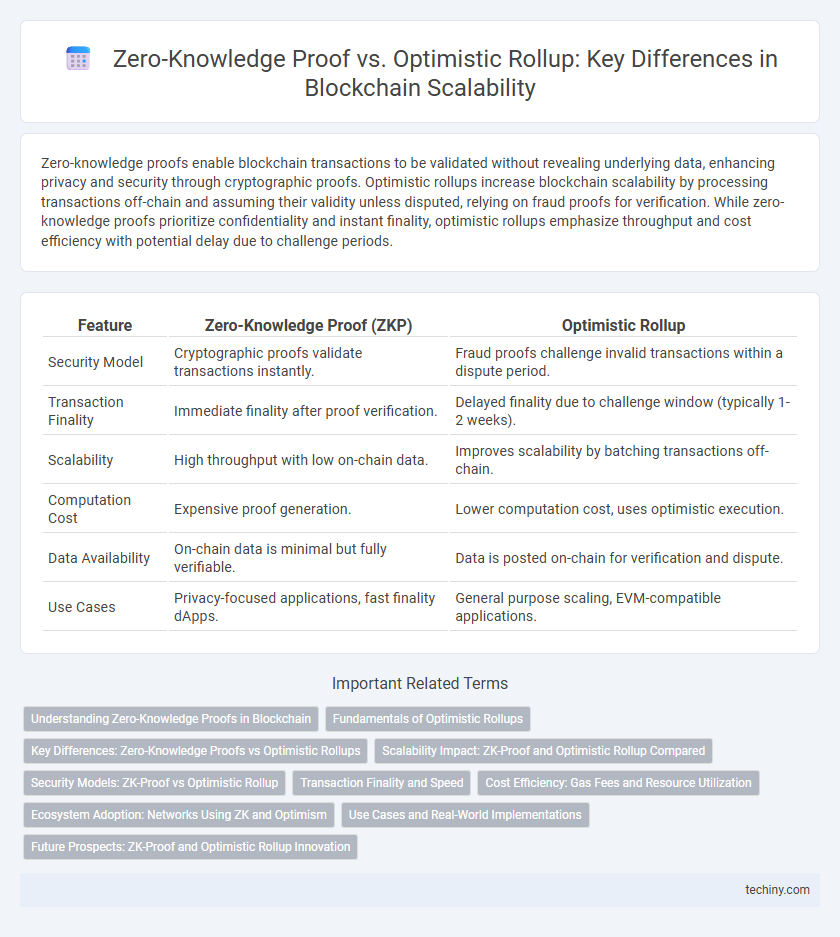Zero-knowledge proofs enable blockchain transactions to be validated without revealing underlying data, enhancing privacy and security through cryptographic proofs. Optimistic rollups increase blockchain scalability by processing transactions off-chain and assuming their validity unless disputed, relying on fraud proofs for verification. While zero-knowledge proofs prioritize confidentiality and instant finality, optimistic rollups emphasize throughput and cost efficiency with potential delay due to challenge periods.
Table of Comparison
| Feature | Zero-Knowledge Proof (ZKP) | Optimistic Rollup |
|---|---|---|
| Security Model | Cryptographic proofs validate transactions instantly. | Fraud proofs challenge invalid transactions within a dispute period. |
| Transaction Finality | Immediate finality after proof verification. | Delayed finality due to challenge window (typically 1-2 weeks). |
| Scalability | High throughput with low on-chain data. | Improves scalability by batching transactions off-chain. |
| Computation Cost | Expensive proof generation. | Lower computation cost, uses optimistic execution. |
| Data Availability | On-chain data is minimal but fully verifiable. | Data is posted on-chain for verification and dispute. |
| Use Cases | Privacy-focused applications, fast finality dApps. | General purpose scaling, EVM-compatible applications. |
Understanding Zero-Knowledge Proofs in Blockchain
Zero-knowledge proofs in blockchain enable one party to verify the truth of a statement without revealing any underlying data, enhancing privacy and security. This cryptographic technique differs from optimistic rollups, which batch multiple transactions off-chain and assume validity until challenged, relying on fraud proofs. Zero-knowledge proofs offer immediate validation and strong privacy guarantees, making them essential for scalable and confidential blockchain applications.
Fundamentals of Optimistic Rollups
Optimistic rollups leverage fraud proofs to enhance Ethereum scalability by executing transactions off-chain while assuming correctness by default, only submitting data on-chain for dispute resolution. This model reduces gas costs and increases throughput without requiring complex cryptographic proofs used in zero-knowledge proofs (ZKPs). Optimistic rollups prioritize transparency and scalability through simple verification mechanisms, making them practical for a wide range of decentralized applications.
Key Differences: Zero-Knowledge Proofs vs Optimistic Rollups
Zero-Knowledge Proofs (ZKPs) enable the validation of transactions without revealing underlying data, ensuring privacy and scalability through succinct cryptographic proofs. Optimistic Rollups, by contrast, assume transactions are valid by default and rely on a dispute resolution mechanism where fraud proofs can be submitted within a challenge period. ZKPs offer near-instant finality with higher computational overhead, while Optimistic Rollups provide easier implementation and compatibility with existing smart contracts but introduce latency due to the challenge window.
Scalability Impact: ZK-Proof and Optimistic Rollup Compared
Zero-knowledge proofs offer enhanced scalability by compressing transaction data into succinct cryptographic proofs, enabling blockchain networks to validate large volumes of transactions off-chain with minimal on-chain data. Optimistic rollups improve scalability by batching multiple transactions off-chain and assuming their validity, only verifying through fraud proofs when disputes arise, reducing on-chain computational load. While ZK-proofs provide faster finality and stronger security guarantees, optimistic rollups achieve scalability with simpler implementation but longer challenge periods impacting transaction throughput.
Security Models: ZK-Proof vs Optimistic Rollup
Zero-knowledge proofs offer strong security guarantees by enabling validators to verify transaction correctness without revealing underlying data, ensuring trustlessness through cryptographic proofs. Optimistic rollups rely on economic incentives and fraud proofs, assuming transactions are valid unless proven otherwise during a challenge period, which introduces latency and potential susceptibility to fraud. The security model of zero-knowledge proofs is inherently proactive and deterministic, while optimistic rollups adopt a reactive security mechanism dependent on participant vigilance.
Transaction Finality and Speed
Zero-knowledge proofs enable near-instant transaction finality by cryptographically validating computations off-chain, ensuring high throughput with minimal latency on blockchain networks. Optimistic rollups rely on a dispute period for fraud proofs, leading to delayed finality typically ranging from minutes to days, which can affect transaction speed. Consequently, zero-knowledge proofs offer faster and more secure transaction confirmation compared to the slower, challenge-based finality in optimistic rollups.
Cost Efficiency: Gas Fees and Resource Utilization
Zero-knowledge proofs significantly reduce gas fees by enabling succinct off-chain computations verified on-chain with minimal data, optimizing resource utilization in blockchain networks. Optimistic rollups lower costs by batching multiple transactions off-chain and assuming correctness, requiring on-chain resources primarily during fraud proofs. Zero-knowledge technology generally offers greater long-term cost efficiency due to smaller proof sizes and faster verification times compared to optimistic rollups' dependency on dispute resolution delays.
Ecosystem Adoption: Networks Using ZK and Optimism
Zero-knowledge proof (ZKP) technology is integrated into ecosystems like zkSync and StarkNet, which emphasize strong privacy and scalability through cryptographic proofs. Optimistic rollups, exemplified by networks such as Optimism and Arbitrum, prioritize fast transaction finality and compatibility with Ethereum's Virtual Machine (EVM). Both ecosystems experience growing adoption due to reduced gas fees and increased throughput, yet ZK-based solutions lead in trust minimization while Optimistic rollups dominate in developer ecosystem maturity.
Use Cases and Real-World Implementations
Zero-knowledge proofs enhance privacy and scalability in blockchain by allowing one party to prove knowledge of information without revealing the data itself, making them ideal for confidential transactions and identity verification. Optimistic rollups increase Ethereum's throughput by processing transactions off-chain while assuming correctness, with fraud proofs enabling dispute resolution, thus supporting decentralized finance (DeFi) and NFT platforms. Real-world implementations include zkSync and StarkNet leveraging zero-knowledge proofs for secure scaling, while Optimism and Arbitrum exemplify optimistic rollups driving mass adoption through cost-effective, high-speed smart contract execution.
Future Prospects: ZK-Proof and Optimistic Rollup Innovation
Zero-knowledge proofs offer enhanced privacy and scalability by enabling transaction validation without revealing underlying data, positioning them as a cornerstone for secure blockchain applications. Optimistic rollups improve throughput and cost-efficiency by processing transactions off-chain while assuming validity, with fraud proofs ensuring security only when disputes arise. Innovations in both technologies are driving the evolution of Layer 2 solutions, with hybrid models combining ZK-proofs and optimistic rollups poised to address Ethereum's scalability and privacy challenges in the near future.
Zero-knowledge proof vs Optimistic rollup Infographic

 techiny.com
techiny.com